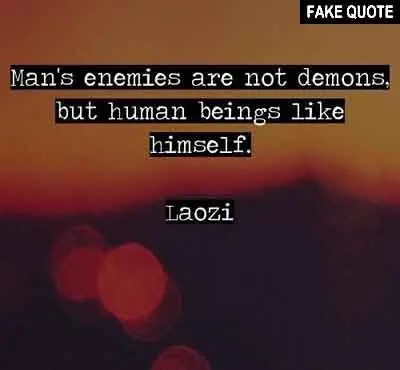Fake Lao Tzu Quote
"Man's enemies..."

This is NOT a quote from Tao Te Ching:
"Man's enemies are not demons, but human beings like himself."
The Book
The Taoism of Lao Tzu Explained. The great Taoist philosophy classic by Lao Tzu translated, and each of the 81 chapters extensively commented. Click the image to see the book at Amazon (paid link).
More about the book here.
|
Lao Tzu would laugh at this statement. Of course men are not demons. They can't be, since they are human beings. Not that Lao Tzu cared much at all for supernatural beings, not even deities, but he could tell the difference. He would regard the quote as pure nonsense.
Stephen Mitchell, author of a very popular version of Tao Te Ching from 1988, obviously sees it differently. The quote is from his rendering of chapter 31, with the slight difference of writing "his" instead of "man's." That's surely an edit when the quote was taken out of its context.
|
90 of the most spread false Lao Tzu quotes, why they are false and where they are really from. Book by Stefan Stenudd. Click the image to see the book at Amazon (paid link).
More about the book here.
|
But Mitchell's version is so far off from the original that I have trouble seeing what line he interpreted this way. Here is the relevant part of Mitchell's chapter 31, listing what "a decent man" prefers:
Peace is his highest value.
If the peace has been shattered,
how can he be content?
His enemies are not demons,
but human beings like himself.
He doesn't wish them personal harm.
Nor does he rejoice in victory.
How could he rejoice in victory
and delight in the slaughter of men?
Here is my version of the same part, referring to the preferences of "the noble ruler":
Peace and quiet are preferred.
Victory should not be praised.
Those who praise victory relish manslaughter.
Those who relish manslaughter
Cannot reach their goals in the world.
And here is James Legge's version from 1891 (page 74), speaking about "the superior man":
Calm and repose are what he prizes; victory (by force of arms) is to him undesirable. To consider this desirable would be to delight in the slaughter of men; and he who delights in the slaughter of men cannot get his will in the kingdom.
Mitchell has allowed himself to expand with his own words on why the enemy should not be despised, which may be commendable but also unnecessary in this context.
Lao Tzu did not feel the need to explain that enemies are people, too. What else could they be? Instead he focused on the importance of regarding war with grief and regret, even when it is won.
For more about Stephen Mitchell and his version of Tao Te Ching, see the chapter A good traveler has no fixed plans.
Stefan Stenudd
April 2, 2017, revised September 9, 2020.
There are many more fake Lao Tzu quotes examined on this website.
Click the header to see a list of them.
Click the header to read a "fake" interview with Stefan Stenudd, the author of
Fake Lao Tzu Quotes.
My Taoism Books
Click the image to see the book at Amazon (paid link).
The Taoism of Lao Tzu Explained. The great Taoist philosophy classic by Lao Tzu translated, and each of the 81 chapters extensively commented.
More about the book here.
The Ancient Wisdom of the Tao Te Ching by Lao Tzu. 389 quotes from the foremost Taoist classic, divided into 51 prominent topics. Click the image to see the book at Amazon (paid link).
More about the book here.
Erroneous Tao Te Ching Citations Examined. 90 of the most spread false Lao Tzu quotes, why they are false and where they are really from. Click the image to see the book at Amazon (paid link).
More about the book here.
|
My Other Websites:
The 64 hexagrams of the Chinese classic
I Ching and what they mean in divination. Try it online for free.
The ancient Chinese life energy
qi (
chi) explained, with simple instructions on how to exercise it.
The many ancient and modern life force beliefs all over the world explained and compared.
Other Books by Stefan Stenudd
Click the image to see the book at Amazon (paid link).
The Greek philosophers and what they thought about cosmology, myth, and the gods.
The life energy
qi (also
chi or
ki) explained, with exercises on how to awaken, increase and use it.
Basic concepts of the peaceful martial art. Aikido principles, philosophy, and fundamental ideas.
Qi, prana, spirit, ruach, pneuma, and many other life forces around the world explained and compared.
Jungian theories on myth and religion examined, from Carl G. Jung to Jordan B. Peterson.
About me
I'm a Swedish author and aikido instructor. In addition to fiction, I've written books about Taoism and other East Asian traditions. I'm also an historian of ideas, researching ancient thought and mythology. Click the image to get to my personal website.

 Tao Te Ching
Tao Te Ching Now it's a book, too!
Now it's a book, too! Tao Quotes
Tao Quotes Cosmos of the Ancients
Cosmos of the Ancients Qi — Increase Your Life Energy
Qi — Increase Your Life Energy Aikido Principles
Aikido Principles Life Energy Encyclopedia
Life Energy Encyclopedia Archetypes of Mythology
Archetypes of Mythology Stefan Stenudd
Stefan Stenudd